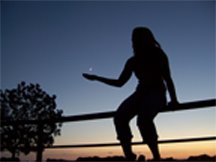After the massacre in 1994 in Hebron, when a Zionist extremist opened fire in the main mosque (the tomb of Abraham) on the last day of Ramadan, killing 29 and wounding hundreds. Israeli soldiers, thinking the shots were part of a Palestinian uprising, killed several other individuals packed into the mosque that day. The city went under curfew (effective house arrest) for several weeks, and a number of other Palestinians who went into the streets to buy more food were shot.

A few years later, Israeli soldiers dragged a young man into her house to be beaten. “This was an insult to me and my home, to beat a man in it, so I demanded that they leave,” she said. The soldiers pointed a gun at her and at man's head, but she wrapped her arms around the young man and said, “this is my son!” The soldiers began to beat her as well.
Muna filed a complaint against the soldiers at the police station, a process that took four days. She spent many hours waiting at the police station, and commented that typically people would give up after waiting four or five hours without being able to speak to anyone. In this case, the soldier was removed from his post, though very often, complaints by Palestinians are ignored or dismissed.
Through educating, standing up against injustice, and her creativity and resilience, for me, Muna is a model of nonviolent resistance, one of many, many inspiring people we've been able to meet throughout Jerusalem and the West Bank.
*Not her real name.

No comments:
Post a Comment